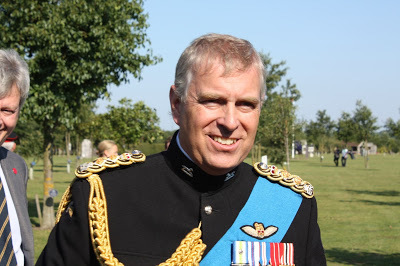Ron MacLean, Prince Andrew, and Narcissism
 Prince Andrew, the grand old Duke of York
Prince Andrew, the grand old Duke of YorkRon MacLean last Saturday, defending his public knifing of Don Cherry, lamented that he was torn between principle and friendship. He turned on Cherry, he claims, on principle.
This, of course, is the opposite of the way it looks—it looks like abandoning his own principles to save his job. Was Judas a man of principle?
Prince Andrew, asked why he continued to associate with Jeffrey Epstein, a convicted pedophile, explained that his error was in “my tendency to be too honourable.”
Again, this seems the opposite of the objective truth. It seems on the face of it dishonourable to engage in possibly involuntary sex with unknown seventeen-year-old girls.
And notice, neatly enough, that MacLean maintains that refusing to denounce a friend when asked is unprincipled, while Andrew maintains that even avoiding a friend in any circumstances is dishonourable.
These two examples bring up a larger point.
When someone does something immoral, and refuses to admit it, like MacLean and Andrew here, they do not tell only a partial lie. They do not just try to ameliorate the fault or offer extenuating circumstances.
For example, MacLean might more plaisubly have said “I thought what Don said was reasonable when he said it, but others convinced me afterwards that it was wrong, and that I had to speak out.” That would still no doubt have been a lie by omission. It seems more likely that he was told he had to do it to save his job. But it would have been only a partial, not a total, lie.
It probably would have helped his public image more, too. People would have found it more believable.
Yet instead he stuck with a completely implausible total denial.
Prince Andrew might have said, “Yes, I knew the accusations, but I just did not believe them.” Again, surely still a lie, but not a total lie. And it probably would have helped his PR case. Some people, looking for an excuse to forgive him, might have seen one here.
Instead, he offered a flagrant total denial that what was a plain misdeed was actually an act of virtue.
It makes it very hard for anyone to sympathize with Andrew, once he has just publicly declared himself “too honourable.”
This illustrates the bigger point that people who are determined, unrepentant sinners never tell only small lies. Instead, they will say the exact opposite of the truth, and stress their exemplary morality and lack of all flaws. Oddly, in doing so, they generally pinpoint their guilt. By appealing to principle, MacLean was actually in effect showing his awareness that what he did was unprincipled. Prince Andrew was showing implicitly that he knew what he did was dishonourable.
Why do people do this? Why do they tell not just partial lies, but blatant reversals of the truth? Even when, or precisely when, they are unlikely to be believed?
Their conscience compels them to. This an example, no doubt, of god using the Devil for his purposes. Realizing the enormity of what they did, they feel some need to verbally get themselves as far away from it as possible. So they go 180 degrees from the admission of any fault.
This more or less explains what we call “narcissism.” To avoid his guilt, MacLean aggressively stresses how principled he is. Andrew stresses how honourable he is. You can readily see how this, over time, grows into what are sometimes called the narcissist’s “delusions of grandeur,” his or her assertion of how faultless they are.
Alcoholics Anonymous implicitly knows this, in requiring participants to take a thorough moral inventory and admit the exact nature of their wrongs. For if this is indeed the genesis of narcissism, the cure for narcissism is actually simple and clear, for all that conventional psychiatry finds it incurable. It is the clear recognition and admission of their own guilt. This is also why the alcoholic must “hit bottom.” They must be confronted with the sin.
But the sin is not necessarily alcoholism. That’s just one possibility; one variant of gluttony. The same mechanism applies for any vice, vices being settled habits of sin.
Exposure and admission are the key.
'Od's Blog: Catholic and Clear Grit comments on the passing parade.
Published on November 19, 2019 10:13
No comments have been added yet.



